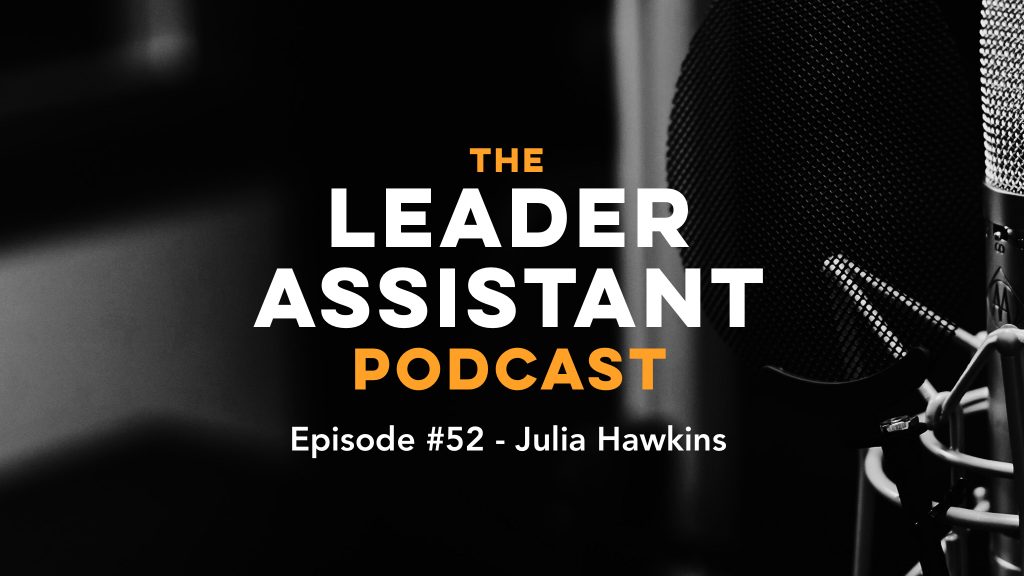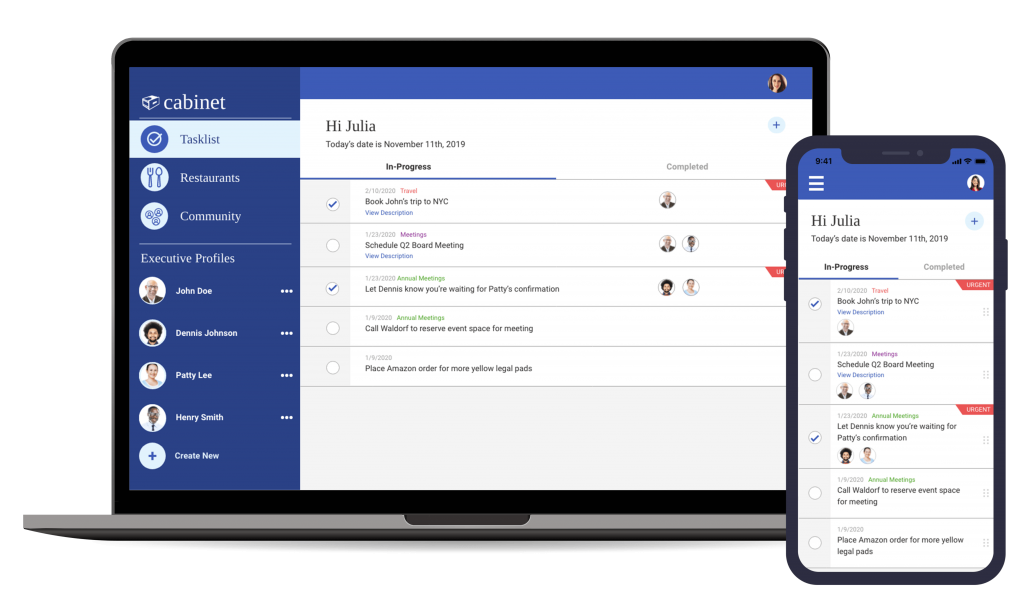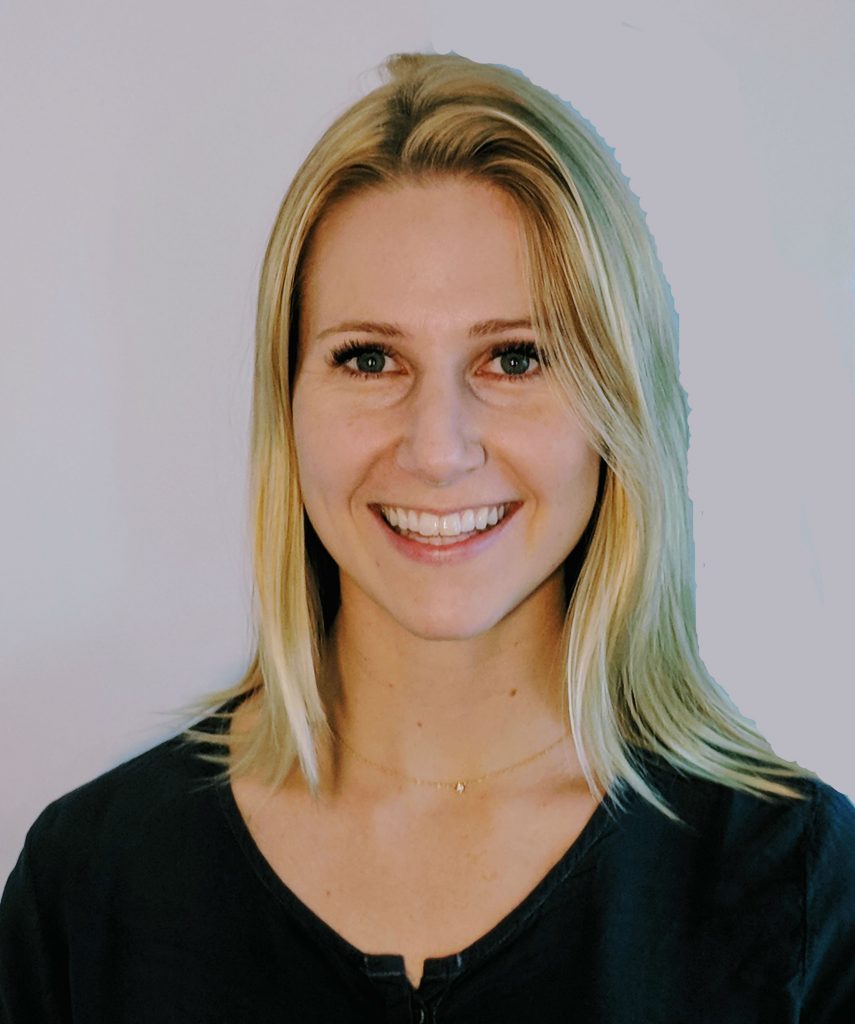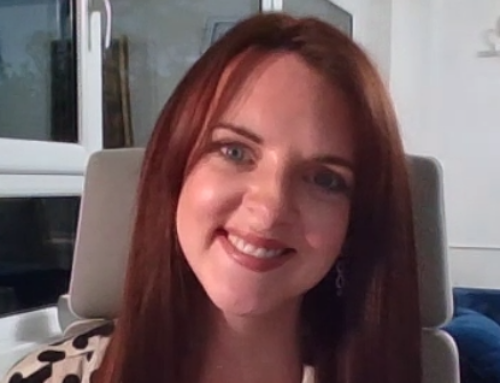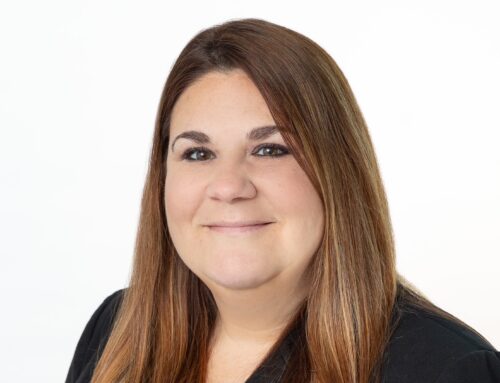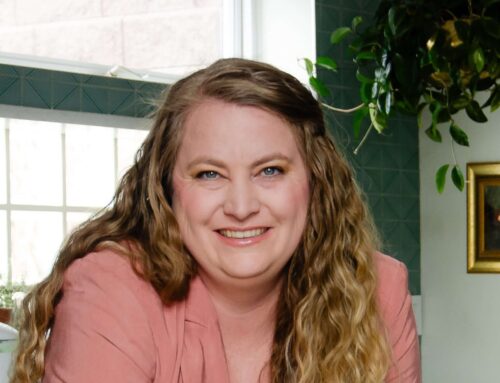Episode 52 of The Leader Assistant Podcast is fun because I get to speak with an EA turned CEO, and we get to hear about a new To-Do list software for assistants.
Julia is a former EA turned entrepreneur. In this episode, we talk about her company, Cabinet, a software and online forum for EAs, what she’s learned from running an online EA community, and more.
SPONSOR: CABINET
On Cabinet, you can join an incredible network of assistants for free or upgrade and use the world’s first digital To-Do List designed for assistants complete with a way to track your accomplishments for performance review season. So yes, Cabinet can probably help you get that raise.
Go to JoinCabinet.com and use the code “LeaderAssistant” for 50% OFF!
LEADERSHIP QUOTE
People don’t buy what you do; they buy why you do it. And what you do simply proves what you believe.
– Simon Sinek
CONNECT WITH JULIA
ABOUT JULIA
Julia is a former executive assistant turned entrepreneur. She is the co-founder of Cabinet, one of the largest online communities for administrative professionals.
SUBSCRIBE
Subscribe to The Leader Assistant Podcast so you don’t miss new episodes!
You can find the show on Apple Podcasts, Spotify, Google Podcasts, Pandora, and Stitcher.
Join my email list here if you want to get an email when a new episode goes live.
JOIN THE COMMUNITY
Join the Leader Assistant Slack Community here, or the Facebook Group here for bonus content and to network with other assistants who are committed to becoming leaders!
LEAVE A REVIEW
If you’re enjoying the podcast, please take 2 minutes to rate and review the show on Apple Podcasts here. Each review helps me stay motivated to keep the show going!
—
EPISODE TRANSCRIPT
Julia Hawkins 0:00
Hi, I’m Julia Hawkins and today’s leadership quote comes from Simon Sinek. People don’t buy what you do they buy why you do it. And what you do simply proves what you believe.
Podcast Intro 0:14
The Leader Assistant Podcast exists to encourage and challenge assistants to become confident game changing leader assistance.
Jeremy Burrows 0:23
Thank you so much for listening. Oh, I’m old. Hi, it’s episode 52 and use your host my data. Hey, leader assistants. Thanks for tuning in Episode 52 of The Leader Assistant Podcast. am excited to tell you today about cabinet. On cabinet you can join an incredible network of assistants for free or upgrade and use the world’s first digital To Do List designed for assistants. It’s complete with a way to track your accomplishments for performance review season. So yes, cabinet can probably help you get that raise, go to join cabinet.com and use the code leader assistant for 50% off to check out the online to do platform. Or again you can join their online forum for free at join cabinet.com Today’s episode is special because I get to speak with Julia Hawkins who’s the CEO and co founder of cabinet. So again, check out join cabinet.com Use the promo code leader assistant for 50% off their new to do list. digital tool. And yeah, you can check out the show notes in a screenshot of cabinet at leaderassistant.com/52 that’s leaderassistant.com/52. I hope you enjoyed this episode. Hey, everyone. Thanks for tuning into The Leader Assistant Podcast. It’s your host, Jeremy Burrows. And today I’m speaking with Julia Hawkins. Julia is the co founder and CEO of cabinet Julia, how’s it going?
Julia Hawkins 2:02
It’s going really well. Jeremy, thank you for having me.
Jeremy Burrows 2:05
Yeah, what part of the world are you in?
Julia Hawkins 2:08
We are in New York City.
Jeremy Burrows 2:10
Awesome. So what was your very first job? Let’s start there and just kind of share what skills you learned in that role, if any, that you still use today?
Julia Hawkins 2:22
Great. Yeah. So I worked at a restaurant as a cashier, and I used to run plates out to customers. I learned Yes, great staple job. I learned that having a great attitude is an actual skill. And it made life better for not just the customers, but it made me really enjoy work just having a positive outlook.
Jeremy Burrows 2:46
Awesome. So when did you become an executive assistant?
Julia Hawkins 2:53
Great question. So I was around 24 years old, I was working for a venture capital firm. And I joined as a Marketing Associate. And while I was there, the company went through a lot of changes. I had worked right next to a executive assistant who I admired so much she was very sharp. And she was that kind of assistant who is a you know, a mirror image of her executive could think like him could make any decision on his behalf. And she would, you know, she would make the right decision. So I had a lot of respect and admiration for her. And so I was pretty devastated. One day, when she told me that she was leaving the company. It was for a personal reason. She’d been there for 10 years. And she she wanted to work closer to home. And, you know, she looked me in the eyes. And she said, you know, if you if you would like to take over my role, you can do everything I can do. And you know, she had been an EA a lifetime EA. So that really meant a lot. And it motivated me. So when you know the company asked if I would take over her responsibilities. I said yes. And I took about, you know, 95% of them, I’d say and I slowly gradually became an EA so for the next few years. I I was an EA as well as wearing a few other hats.
Jeremy Burrows 4:20
Awesome. So what did you enjoy about the role?
Julia Hawkins 4:25
I enjoyed helping people. I think that’s in my DNA. I like to put the spotlight on other people. And it was great to see them succeed. And, you know, I liked working to like building the relationships with the partners. You know, you can learn a lot from leaders, you know, just watching them observing them, see how they act. So I like that being you know, very close with those with those folks.
Jeremy Burrows 4:53
Nice. So do you have any productivity tips or maybe task management tips form your time as an assistant.
Julia Hawkins 5:02
Yes. So well, I learned this recently with cabinet. But I wish I had done done it back in the day when I was an EA. So it’s to tie your tasks or your daily, your daily workload to goals or company KPIs. Because I would get asked, as all as I get asked to do a performance review and you know, show how your, how you’ve grown in the role. Well, and describe, you know, what value you think you added in the year sometimes for a bonus. And I was really hard because I, you know, I wasn’t trained on how to, you know, how to tie all the meetings and all the events and all the trips, I’m booking to the, you know, the goals of the executives, and I wasn’t very explicit and understanding what those goals were. Of my executives, I came to understand them, but I didn’t, you know, I didn’t ask them explicitly, hey, you know, what are your top three goals right now? Or what are your biggest priorities? So I wish I had, I wish I had kind of created that that loop. And I think they have been helpful for me and for also the managers.
Jeremy Burrows 6:14
Yeah, it’s something that I can relate to when I was, in my first EA role, kind of didn’t really consider that I just kind of did what was thrown my way. And if something wasn’t being thrown my way, I just kind of leave it alone. And so yeah, it’s definitely a game changing mindset to really tie your job to the overall company and your executives, goals. Yeah,
Julia Hawkins 6:43
exactly. And to tie it back to the quote, The Simon Sinek, quote, and you know, it’s true for a lot of people that people don’t buy what you do they buy, why you do it. And you know, the time what you do to your goals, helps you explain to folks, you know, why you’re doing things, and that builds helps them build trust in what you’re what you’re doing.
Jeremy Burrows 7:07
So when you’re in EA, did you do any sort of professional development or training or classes or conferences to grow your skills? And how would you encourage assistants now to develop and hone new skills?
Julia Hawkins 7:24
Wow, I never knew that that world existed. So until I went to grad school, got an MBA and started cabinet, I did not know that world existed. And, you know, I would encourage people to to research, do research and explore how many things that are out there now. It’s, it’s wonderful.
Jeremy Burrows 7:45
So you said you, you got your MBA?
Julia Hawkins 7:49
I did. Yeah. So I left the firm to, to get an MBA to hone in on my business chops. And it was getting my MBA, where I met my co founder, who was an engineer is an engineer and was getting a master’s in Connective Media.
Jeremy Burrows 8:07
Nice. So I like to say that being an executive assistant for a few years is oftentimes better than getting an MBA now that you’ve done both. What would you say?
Julia Hawkins 8:20
I definitely agree with that. I had a, I had a very specific MBA. So it’s a technical MBA. So you know, we took edetate computer science courses, and, and so that, that definitely prepared me better for that, you know, this part of my job building this technology with my co founder with my team, so, but I would agree, yeah, being an AI is the best MBA you can get.
Jeremy Burrows 8:49
Awesome. So let’s talk a little bit about your company then. So why did you start cabinet?
Julia Hawkins 8:57
Yeah, awesome. So we wanted to build a platform that empowered assistants, and wanted to build something that was very unique for them. Because when I was young, I didn’t feel like there was much technology out there designed. For me specifically, um, you know, there’s a lot of tools that we that we tweak to fit our needs, you know, like OneNote, and Trello. But I knew the capability existed, something more powerful than that. And, and so, you know, it’s funny, we, we knew as well that, you know, a community was super important, like, I felt very isolated to my job. And so one of the features was, you know, we want to be able to connect assistance across companies to be able to exchange best practices or you know, business travel recommendations and so forth. But that feature actually turned into much something much bigger, it kind of took off. So for the last year and a half we’ve been, we’ve been running a community have executive assistants very forward thinking executive assistants. And we yeah, we were about almost 2000 Now all grown through word of mouth and personal invitations and member referrals. So we’re really happy about that. But we’re still on our mission to build a platform that is a little bit more technically technically capable. So we just launched a new platform called cabinet plus. And so now, we are really excited about this next phase of cabinet.
Jeremy Burrows 10:36
Awesome. So let’s talk about the community element. First, what, what sets apart cabinet from, say, a Facebook group or a Slack community? Or another online forum for assistance?
Julia Hawkins 10:52
Great question. So we built cabinet entirely from the ground up. So this is not, you know, a Facebook group or slack channel or this is, you know, a community where every aspect of it was designed intentionally for assistance. So some of the big differences is that its cabinet is very more professional, I’d say. Whereas a lot of Facebook groups are more informal and casual and, you know, the algorithms with Facebook and LinkedIn, make it such that sometimes, you know, the, the longer the posts, and the more dramatic the situation, will will grab the attention where, you know, if a person comes to one of those groups and needs to ask, you know, a very business forward question, like, you know, hey, I’m booking my boss, a fishing trip to Mongolia, does anyone have any recommendations, and that won’t be seen because of those algorithms. So we wanted to make a very fair community. But that doesn’t mean our questions aren’t also fun sometimes. You know, and some people do come with you needing to explain some experiences that they’re having. And but it’s, you know, we also put a word limit on it. So people can’t go, you know, very verbose and be very loquacious. It’s, people are concise. So, what one attribute two I love is that we will match a question with experts. So when you sign up for the community, you can say, oh, here are my areas of expertise. Like maybe I’m a OneNote, specialist. Maybe I’m really great at event planning. And then you’ll say, you know, where you live, or where you work, you know, Atlanta, New York, and when a question is asked, that has any of those keywords and we will send an email to that group of people who specialize in that area, or maybe lives in that area? So we get questions all the time about, you know, event recommendations for venues, business, travel, hotels, or restaurants, technology that people are struggling with to understand or do something with? And so it’s great to see that, you know, people get answers to their questions.
Jeremy Burrows 12:58
Yeah, that’s awesome. So the community element is pretty powerful. What, what in general, do you think is the key to the assistance, taking advantage of communities like this?
Julia Hawkins 13:14
Yeah, so I just think we were all stronger together, sort of the wisdom of the crowds theory. And, and people need to, you know, realize that they’re not alone in what they’re doing. And you know, we’re the world is very virtual now. And we’ve we’re building a place like cabinet where it’s trusted executive assistants, you can turn to them. And it’s not, it’s not shameful. It’s actually very professional. Evan, who is my co founder, he’s an engineer. And he introduced me to a site that millions and millions of engineers use for the exact same purpose, which is called Stack Overflow. Yeah, I’m sure many people are familiar with it. So. So it’s, it’s what every engineer does, whenever they hit a wall, they go to Stack Overflow, they either search, you know, if someone’s already asked a question, or they create a new question, and it’s pretty amazing how people are willing to help.
Jeremy Burrows 14:17
So over the last several years, what transformation Have you seen happen in the administrative professional landscape?
Julia Hawkins 14:29
So there is a movement happening. And I’ve seen it at conferences. You know, I see it in your podcast, Jeremy. I read about it online. You know, this movement from a an admin that just gets stuff done to an admin who is a strategic business partner to their executive. It’s it’s happening and all the coaches and trainers and thought leaders in this space are our teaching admins on the ground Double how to be a strategic business partner. And so we have, you know, there’s a lot of moving pieces in that. And so some of the things, you know, people ask on cabinet, like, how do we do? How do we do performance reviews? is a great example. You know, watching people say, oh, you know, you need to start tying your tasks to the goals of the company, because everyone now is data driven. And we need to be to and our real goal. So. So that’s been, that’s been fascinating to see kind of the field evolves, you know, from the ground up.
Jeremy Burrows 15:39
Yeah, that’s awesome. So, tell me a little bit about that. I’m going to play devil’s advocate, and I’m going to say, you know, why would I need to sign up for a different, just another assistant community? Why, why why cabinet versus a Facebook group or LinkedIn? You said a little bit about that. But then also, you know, you’re talking about your cabinet? Plus, is
Julia Hawkins 16:06
that right? Cabinet? Plus? Yes, exactly. What
Jeremy Burrows 16:09
about cabinet plus and having tasks management? How can assistants listening, go to their executive, and say, I know, our company pays for Trello, or on our know, our company pays for OneNote. But the value that cabinet brings to administrative professionals like myself, you know, far and above outweighs the value that I get out of a Trello or another Facebook group, etc, if that makes sense.
Julia Hawkins 16:42
Yeah. So, you know, it’s always about explaining to your executive or your manager, what, you know, how will this benefit the company? How does this improve, you know, your executives life, and, you know, we try really hard to focus on the benefits that cabinet and cabinet plus provide to the executive, which you know, is, we believe at a high level, it’s, you know, it’s helping assistants master the art of strategically lightening the load of their executives, you know, at a very high level, like what is an assistant and assistant is there to, you know, create time for others. So, you know, that’s one one view of it, but And so what we what we try to do really hard is tie everything to how is this going to help the executive so for cabinet plus, we are, we build a place where you can store your executives, profile. So if you ever go on vacation, you have an assistant there, that is covering for you that has that knows the loyalty numbers, you know, their favorite restaurants, what kind of type of day they prefer meetings, what is their communication style, so we help capture that information. And we enable secure, secure sharing. So you know, coverage is really important in this space now. Because you know, assistants are offering a service, you don’t want that service to end, just while you know, you step out of the office, as well as showing how all the tasks that you do. So one of the core features of cabinet Plus is a to do list. And, you know, we enable you to input all the goals of your executive. And at the end of a month or quarter, you go back, you reflect on your to do list and all the things you have done, and you tie those things that you’ve got done to the simple goals of your executives. And then at the end of the month, or the quarter of the year, you can run a report that shows how all of those things you worked on, contributed to the effort of your executive. And that’s really powerful, because that is what you know, your executive needs to see in order to explain, you know, everyone wants an assistant, right? So they need to show to the CFO or whoever runs the budget that you know, your work is really contributing to the bottom line of the business. So I think that’s a long answer. No, no,
Jeremy Burrows 19:06
that’s, that’s great. I think that. To summarize it, it sounds like you are equipping and empowering assistance with real data that they can then submit to their and run reports, like you said, and share reports of real data of the impact that their job is having with their executives who by the way, are more often than not very data driven. So
Julia Hawkins 19:35
exactly. Yeah, exactly. Everyone wants to see the numbers now.
Jeremy Burrows 19:40
Yeah, that’s awesome that you’re providing those sounds like it’s fairly simple, streamlined way to do that, too. So it’s awesome.
Julia Hawkins 19:49
Thank you. And we really can’t take the credit, though. I mean, this is this is what I’m talking about with the movement. You know, we’ve worked with a lot of the coaches we’ve been collaborating with, you know, Lucy and Bonnie low cream and Jillian and Melissa and all these people who are that’s what you know they do is they train assistants to think like this and to work like this. So we, you know, we don’t we know technology. And so we’re just trying to bring that technology, you know, make that streamline exactly like you said, streamline that process.
Jeremy Burrows 20:23
Awesome. So why the name cabinet?
Julia Hawkins 20:28
So, so our logo is is actually a physical cabinet, if you’ve seen it like, like the cabinet in your office where you store things, but that’s actually only half the reason. So the other half of the reason is, you know, a cabinet is also a term used to describe a group of people who you consider to be your trusted advisors. And so we consider assistants to be advisors to their to those that they support. Love it. Thank you. Naming is hard.
Jeremy Burrows 21:01
Oh, yeah, we I could I could do a whole episode on naming. We had to change our name, I think three times in three and a half years. So nice. That’s fun. Yeah. Yeah. Awesome. Well, what have you learned? What’s the biggest thing you’ve learned? Running your own company, and having to shift and evolve and really meet the demand? That’s there and the administrative community?
Julia Hawkins 21:31
Yeah, I think we’ve learned how important community is, you know, we thought we were building a feature a small feature in this bigger product with the community, and it just really took off. And so you know, we’ve seen that even as we’re transitioning into cabinet plus and up here becoming more of a SAS workflow platform, you know, the community is going to play a big role in that. And it’s, it’s amazing to see how how people support each other without having any financial incentive. It’s just incredible. I mentioned that Mongolia question that actually happened. So one of our earliest questions when we only had about 200 people in the community, somebody posted, Hi, I’m looking for some advice. I’m booking my executive to Mongolia for a fishing trip. And he wants me to plan everything. Has anyone ever done this? And Evan, and I looked at each other. And we were like, oh, no, like, This is so nice. Like, and who’s gonna have the time to just like, provide all this information, this whole trip, and within an hour, I think somebody hadn’t gone on. And sure enough, they booked their, their executive to Mongolia recently, and, you know, had all these interesting, fascinating things to share. And so we were we were moved. And it’s just been like that ever since. And there’s no question that’s too niche for, for an executive assistant to to solve.
Jeremy Burrows 23:04
yeas are like the army, if you will, in the world that has to deal with all those random oddball crazy requests. So powerful community?
Julia Hawkins 23:17
Yes. Good, good community to know. Yeah.
Jeremy Burrows 23:21
So what makes an assistant a leader?
Julia Hawkins 23:24
That’s a great question. So I mean, a lot of things. But I would say something that makes them really unique. Their leadership unique is their work across groups and across organizations. So you know, supporting an executive, but really working across all the dimensions of the business. And you know, you can find them in every field and every, you know, every corner of the world. Awesome.
Jeremy Burrows 23:55
Well, Julia, very, very exciting to hear about your story with cabinet. And I’m very thrilled that there are actually software companies. Still not very many, but there are some software companies now for assistance, and there wasn’t any for ourselves such a long time. And I think that just shows that people like yourself, who have been an assistant before, kind of sick of having to deal with tools in platforms that are meant for other titles and other roles and companies. And instead of kind of complaining about it or sitting on your hands, you said you know what, I’m gonna go get an MBA and I’m gonna start my own. So I really appreciate you taking a risk like that and sharing your story with us.
Julia Hawkins 24:49
Thank you, Jeremy. And same to you. I’m, I’m so impressed with what you’ve built here. It’s an honor to be on your podcast. Thank you.
Jeremy Burrows 25:00
Awesome. Well, where can we find cabinet and support what you’re up to and find out more about it?
Julia Hawkins 25:07
Yes, please do go to join cabinet.com. So sign up, you can sign up for the community for free. And if you’re interested in cabinet Plus, you can use the code leader assistant for 50% off.
Jeremy Burrows 25:23
Awesome. Well, I will share those links and the promo code leader assistant in the show notes so people can kind of quickly get there. And then yeah, thanks again for your time. And I really look forward to seeing where you guys take cabinet and how, how you’re able to help the assistant community.
Julia Hawkins 25:45
Thanks, Jeremy and I look forward to some cabinet. The Leader Assistant Podcast collaborations.
Jeremy Burrows 25:52
Sounds great. We’ll talk soon. Thanks again, Julia from cabinet. It’s a great episode, definitely check out their online platform join cabinet.com And don’t forget to use the promo code leader assistant to get 50% off their new To Do List software for assistance. Again, you can join the online forum for free at join cabinet.com And if you want to sign up for the to do list for cabinet Pro, just use the promo code leader assistant for 50% off
Unknown Speaker 26:38
please move you on Apple podcast. Goburrows.com

